人教版(2019)选择性必修第三册Unit 3 Environmental Protection Grammar直接引语和间接引语课件-(20张ppt)
文档属性
| 名称 | 人教版(2019)选择性必修第三册Unit 3 Environmental Protection Grammar直接引语和间接引语课件-(20张ppt) | 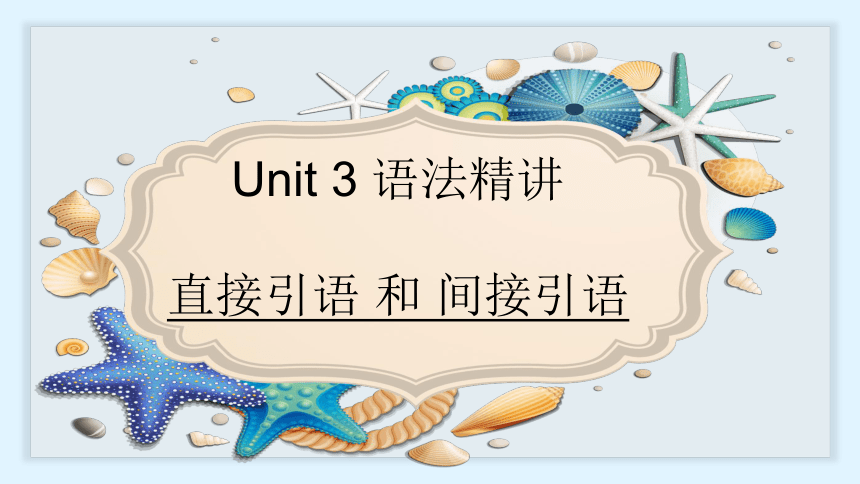 | |
| 格式 | zip | ||
| 文件大小 | 801.5KB | ||
| 资源类型 | 教案 | ||
| 版本资源 | 人教版(2019) | ||
| 科目 | 英语 | ||
| 更新时间 | 2022-05-10 15:30:47 | ||
图片预览

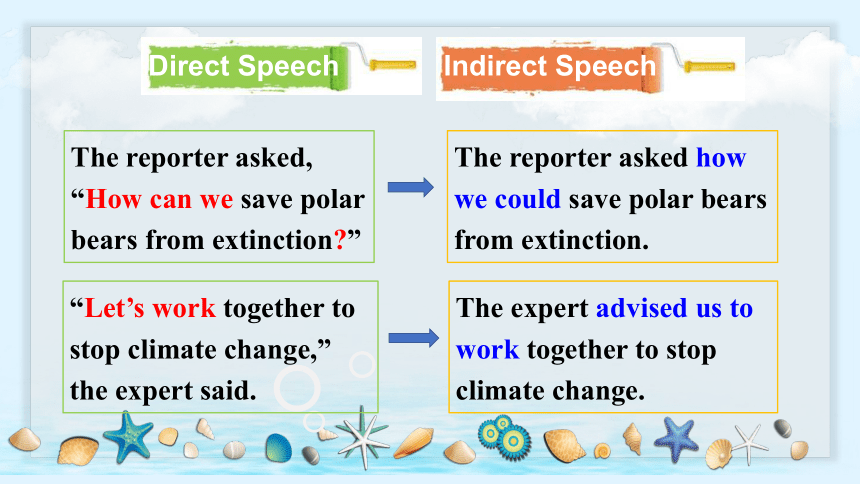

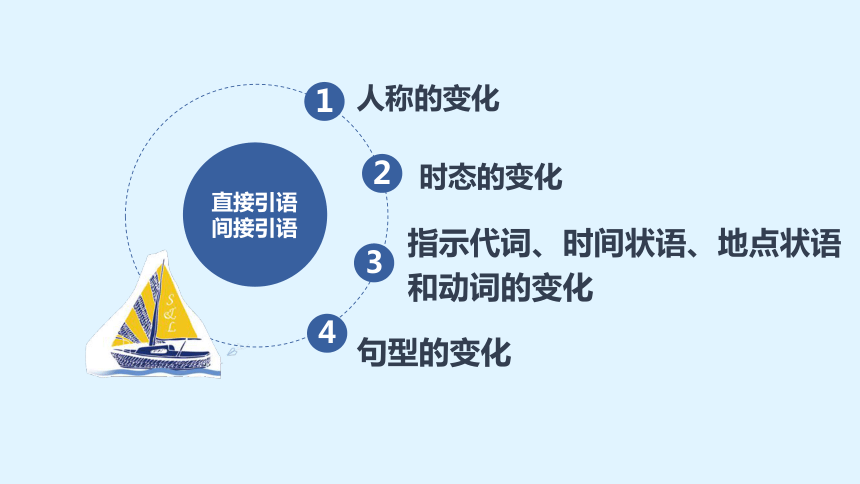
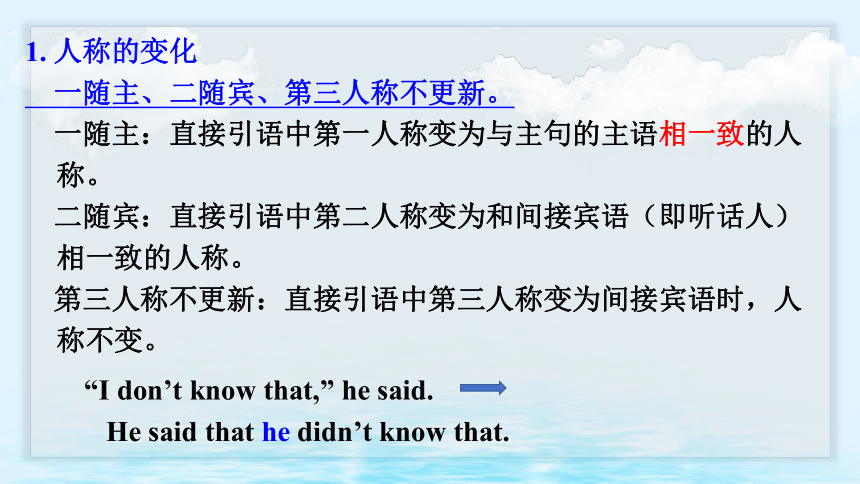
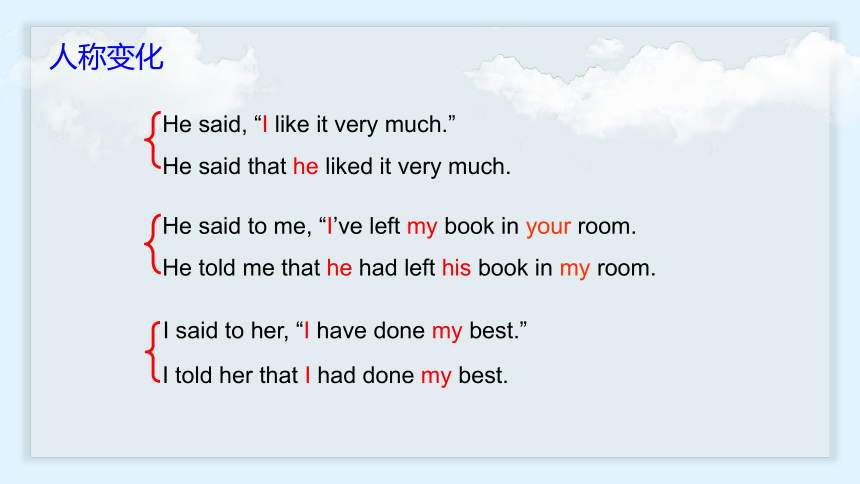
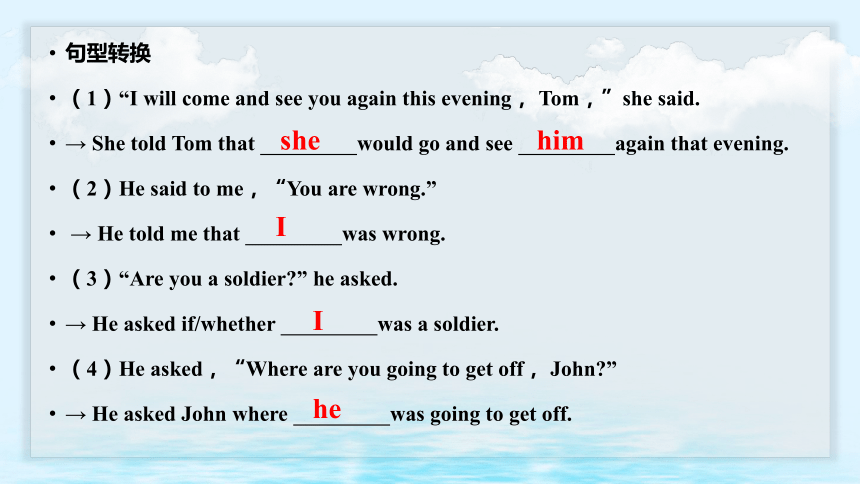
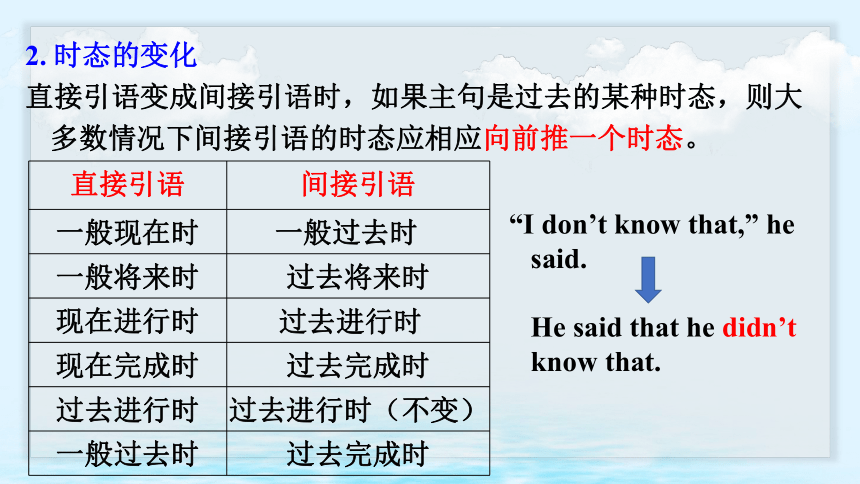

文档简介
(共20张PPT)
Unit 3 语法精讲
直接引语 和 间接引语
The reporter asked, “How can we save polar bears from extinction ”
The reporter asked how we could save polar bears from extinction.
Direct Speech
Indirect Speech
“Let’s work together to stop climate change,” the expert said.
The expert advised us to work together to stop climate change.
概念
直接引述别人的原话,叫____________;
直接引语
用自己的话转述别人的话,叫 _________。
间接引语
直接引语通常都用_________括起来,
引号“ ”
间接引语在多数情况下都构成一个 ________。
宾语从句
直接引语变为间接引语时,从句中的人称、时态、指示代词、时间状语、地点状语和动词、句型等一般要作相应的变化。
直接引语
间接引语
时态的变化
人称的变化
1
2
指示代词、时间状语、地点状语和动词的变化
3
句型的变化
4
1. 人称的变化
一随主、二随宾、第三人称不更新。
一随主:直接引语中第一人称变为与主句的主语相一致的人称。
二随宾:直接引语中第二人称变为和间接宾语(即听话人)相一致的人称。
第三人称不更新:直接引语中第三人称变为间接宾语时,人称不变。
“I don’t know that,” he said.
He said that he didn’t know that.
He said, “I like it very much.”
He said that he liked it very much.
He said to me, “I’ve left my book in your room.
He told me that he had left his book in my room.
I said to her, “I have done my best.”
I told her that I had done my best.
人称变化
句型转换
(1)“I will come and see you again this evening, Tom,”she said.
→ She told Tom that would go and see again that evening.
(2)He said to me,“You are wrong.”
→ He told me that was wrong.
(3)“Are you a soldier ” he asked.
→ He asked if/whether was a soldier.
(4)He asked,“Where are you going to get off, John ”
→ He asked John where was going to get off.
she
I
him
I
he
2. 时态的变化
直接引语变成间接引语时,如果主句是过去的某种时态,则大多数情况下间接引语的时态应相应向前推一个时态。
直接引语 间接引语
一般现在时 一般过去时
一般将来时 过去将来时
现在进行时 过去进行时
现在完成时 过去完成时
过去进行时 过去进行时(不变)
一般过去时 过去完成时
“I don’t know that,” he said.
He said that he didn’t know that.
1. 如果直接引语表述的是客观真理,变成间接引语时,时态不变。
The teacher said to us, “Light runs much faster than sound.”
→The teacher told us light runs much faster than sound.
注意
The teacher said, “World War II ended in 1945.”
→ The teacher said that World War II ended in 1945.
2. 如果直接引语中有明确的表示过去时间的状语,变成间接引语时,时态不变。
注意
My father said to me, “ The house was completely transformed in 2017.”
My father told me that the house was completely transformed in 2017.
句型转换
(1)The teacher said,“You are doing OK.”
→ The teacher said that doing OK.
(2)He said,“I have written a novel.”
→He said that a novel.
(3)He said,“She will come here to have a long holiday.”
→ He said that go there to have a long holiday.
(4)The teacher said,“Where there is a will,there is a way.”
→ The teacher said that where there a will,there a way.
(5)Jane said,“Mary,where were you going when I met you on the bus ”
→Jane asked Mary where when she met her on the bus.
we were
he had written
she would
is
she was going
is
变化项目 直接引语 间接引语
指示代词 this
these
时间状语 now
today
this morning/ week
that
those
then
that day
that morning/ week
3. 指示代词、时间状语、地点状语和动词的变化。
yesterday
ten days ago
tomorrow
next week
last week
the day before yesterday
the day after tomorrow
地点状语 here
方向性 动词 come
bring
the day before
ten days before
the next day/ the following day
there
go
take
two days before
in two days’ time
the next week/ the following week
the week before
句型转换
(1)“I will come and help you tomorrow,John,” she said.
→ She told John that she would and help her ________________.
(2)“I’ll come and see you again this evening, Tim,”he said.
→ He told Tim that he would go and see him again .
(3)Mr Harry asked,“John,have you passed the exam yesterday ”
→ Mr Harry asked John whether he had passed the exam _________.
(4)The old man said,“I like to talk with these young men.”
→ The old man said that he liked to talk with young men.
(5)She said to me,“I lived here five years ago.”
→ She told me she had lived five years .
the next day
that evening
the day before
those
there
go
before
4. 句型的变化
①直接引语是陈述句,间接引语用连接词that引导,that可省略。
②直接引语是一般疑问句,间接引语用whether或if引导,疑问语序变成陈述语序,谓语动词say/said 变成ask/asked。
③直接引语是特殊疑问句,间接引语用原来的疑问词引导,疑问语序变为陈述语序。
④直接引语是祈使句,间接引语变为ask/tell/order/advise sb (not) to do.
①直接引语是陈述句,间接引语用连接词that引导,that可省略。
John told her, “I’d like to see a movie now.”
→ John told her (that) he would like to see a movie then.
②直接引语是一般疑问句,间接引语用whether或if引导,疑问语序变成陈述语序,谓语动词say/said 变成ask/asked。
The reporter asked, “Will polar bears die out because of climate change ”
→ The reporter asked whether/if polar bears would die out because of climate change.
③直接引语是特殊疑问句,间接引语用原来的疑问词引导,疑问语序变为陈述语序。
The teacher asked, “Where have you been ”
④直接引语是祈使句,间接引语变为ask/tell/order/advise sb (not) to do.
→The teacher asked me where I had been.
He said to Ann, “Tell me your problem.”
→He told Ann to tell him her problem.
“Be careful with the dog, boys,” she said.
→She warned the boys to be careful with the dog.
“Don’t work in bed, Tom,” she said.
→She told Tom not to work in bed.
句型转换
(1)He said,“I’ve left my book in your room.”
→He told me he his book in my room.
(2)She said,“Do you like watching the advertisements on TV ”
→She asked me I watching the advertisements on TV.
(3)“Where did you find the ads for jobs abroad ” Bill asked.
→ Bill asked the ads for jobs abroad.
that
whether
where I had found
liked
had left
句型转换
(4)“What are you doing now ” Mom asked.
→Mom asked then.
(5)He said,“Please come here again tomorrow.”
→He again .
(6)He said,“Don’t make so much noise,boys.”
→ He told the boys so much noise.
what I was doing
asked me to go there
not to make
the next day
Thank You!
Unit 3 语法精讲
直接引语 和 间接引语
The reporter asked, “How can we save polar bears from extinction ”
The reporter asked how we could save polar bears from extinction.
Direct Speech
Indirect Speech
“Let’s work together to stop climate change,” the expert said.
The expert advised us to work together to stop climate change.
概念
直接引述别人的原话,叫____________;
直接引语
用自己的话转述别人的话,叫 _________。
间接引语
直接引语通常都用_________括起来,
引号“ ”
间接引语在多数情况下都构成一个 ________。
宾语从句
直接引语变为间接引语时,从句中的人称、时态、指示代词、时间状语、地点状语和动词、句型等一般要作相应的变化。
直接引语
间接引语
时态的变化
人称的变化
1
2
指示代词、时间状语、地点状语和动词的变化
3
句型的变化
4
1. 人称的变化
一随主、二随宾、第三人称不更新。
一随主:直接引语中第一人称变为与主句的主语相一致的人称。
二随宾:直接引语中第二人称变为和间接宾语(即听话人)相一致的人称。
第三人称不更新:直接引语中第三人称变为间接宾语时,人称不变。
“I don’t know that,” he said.
He said that he didn’t know that.
He said, “I like it very much.”
He said that he liked it very much.
He said to me, “I’ve left my book in your room.
He told me that he had left his book in my room.
I said to her, “I have done my best.”
I told her that I had done my best.
人称变化
句型转换
(1)“I will come and see you again this evening, Tom,”she said.
→ She told Tom that would go and see again that evening.
(2)He said to me,“You are wrong.”
→ He told me that was wrong.
(3)“Are you a soldier ” he asked.
→ He asked if/whether was a soldier.
(4)He asked,“Where are you going to get off, John ”
→ He asked John where was going to get off.
she
I
him
I
he
2. 时态的变化
直接引语变成间接引语时,如果主句是过去的某种时态,则大多数情况下间接引语的时态应相应向前推一个时态。
直接引语 间接引语
一般现在时 一般过去时
一般将来时 过去将来时
现在进行时 过去进行时
现在完成时 过去完成时
过去进行时 过去进行时(不变)
一般过去时 过去完成时
“I don’t know that,” he said.
He said that he didn’t know that.
1. 如果直接引语表述的是客观真理,变成间接引语时,时态不变。
The teacher said to us, “Light runs much faster than sound.”
→The teacher told us light runs much faster than sound.
注意
The teacher said, “World War II ended in 1945.”
→ The teacher said that World War II ended in 1945.
2. 如果直接引语中有明确的表示过去时间的状语,变成间接引语时,时态不变。
注意
My father said to me, “ The house was completely transformed in 2017.”
My father told me that the house was completely transformed in 2017.
句型转换
(1)The teacher said,“You are doing OK.”
→ The teacher said that doing OK.
(2)He said,“I have written a novel.”
→He said that a novel.
(3)He said,“She will come here to have a long holiday.”
→ He said that go there to have a long holiday.
(4)The teacher said,“Where there is a will,there is a way.”
→ The teacher said that where there a will,there a way.
(5)Jane said,“Mary,where were you going when I met you on the bus ”
→Jane asked Mary where when she met her on the bus.
we were
he had written
she would
is
she was going
is
变化项目 直接引语 间接引语
指示代词 this
these
时间状语 now
today
this morning/ week
that
those
then
that day
that morning/ week
3. 指示代词、时间状语、地点状语和动词的变化。
yesterday
ten days ago
tomorrow
next week
last week
the day before yesterday
the day after tomorrow
地点状语 here
方向性 动词 come
bring
the day before
ten days before
the next day/ the following day
there
go
take
two days before
in two days’ time
the next week/ the following week
the week before
句型转换
(1)“I will come and help you tomorrow,John,” she said.
→ She told John that she would and help her ________________.
(2)“I’ll come and see you again this evening, Tim,”he said.
→ He told Tim that he would go and see him again .
(3)Mr Harry asked,“John,have you passed the exam yesterday ”
→ Mr Harry asked John whether he had passed the exam _________.
(4)The old man said,“I like to talk with these young men.”
→ The old man said that he liked to talk with young men.
(5)She said to me,“I lived here five years ago.”
→ She told me she had lived five years .
the next day
that evening
the day before
those
there
go
before
4. 句型的变化
①直接引语是陈述句,间接引语用连接词that引导,that可省略。
②直接引语是一般疑问句,间接引语用whether或if引导,疑问语序变成陈述语序,谓语动词say/said 变成ask/asked。
③直接引语是特殊疑问句,间接引语用原来的疑问词引导,疑问语序变为陈述语序。
④直接引语是祈使句,间接引语变为ask/tell/order/advise sb (not) to do.
①直接引语是陈述句,间接引语用连接词that引导,that可省略。
John told her, “I’d like to see a movie now.”
→ John told her (that) he would like to see a movie then.
②直接引语是一般疑问句,间接引语用whether或if引导,疑问语序变成陈述语序,谓语动词say/said 变成ask/asked。
The reporter asked, “Will polar bears die out because of climate change ”
→ The reporter asked whether/if polar bears would die out because of climate change.
③直接引语是特殊疑问句,间接引语用原来的疑问词引导,疑问语序变为陈述语序。
The teacher asked, “Where have you been ”
④直接引语是祈使句,间接引语变为ask/tell/order/advise sb (not) to do.
→The teacher asked me where I had been.
He said to Ann, “Tell me your problem.”
→He told Ann to tell him her problem.
“Be careful with the dog, boys,” she said.
→She warned the boys to be careful with the dog.
“Don’t work in bed, Tom,” she said.
→She told Tom not to work in bed.
句型转换
(1)He said,“I’ve left my book in your room.”
→He told me he his book in my room.
(2)She said,“Do you like watching the advertisements on TV ”
→She asked me I watching the advertisements on TV.
(3)“Where did you find the ads for jobs abroad ” Bill asked.
→ Bill asked the ads for jobs abroad.
that
whether
where I had found
liked
had left
句型转换
(4)“What are you doing now ” Mom asked.
→Mom asked then.
(5)He said,“Please come here again tomorrow.”
→He again .
(6)He said,“Don’t make so much noise,boys.”
→ He told the boys so much noise.
what I was doing
asked me to go there
not to make
the next day
Thank You!
